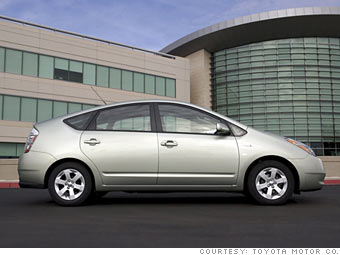
The Toyota Prius alone makes up more than half of all U.S. hybrid car sales. Meanwhile, Toyota makes money while Detroit automakers do not. But it's not true that Toyota is profitable because it makes hybrids - and vice-versa for Detroit
The No.2 seller of hybrids in October was Ford Motor Co. which sold 9% of the vehicles in this country. GM now offers as more hybrid models - seven in all - than Toyota, which offers six. (Toyota obviously sells far more of theirs.)
But hybrids still represent only 2.6% of all U.S. vehicle sales. Last month, Americans bought about 22,000 hybrid vehicles of all types, according to data from R.L. Polk and HybridCars.com. In that same month when overall U.S. auto sales plummeted 31%, GM alone sold more than twice that many full-size pickups.
Because of high costs for batteries and sophisticated electronics, hybrids are more costly to produce, making them less profitable than other cars - if they turn a profit at all. (Toyota has said the Prius does make money.)
Profits aside, Toyota has benefited from the public image boost of being the industry leader in hybrids. A recent survey of car shoppers on Kelley Book's KBB.com auto site showed that more buyers considered Toyota a leader in fuel economy than any other automaker.
What's to come: Ford, GM and Chrysler are introducing more hybrid models over the next two years. GM's emphasis has been on the Chevrolet Volt, a plug-in electric car with a small engine on board to generate electricity for longer drives.
Chrysler has also said it will begin selling a range-extended electric vehicle similar to the Volt at about the same time the Volt goes on sale.
NEXT: Union workers
